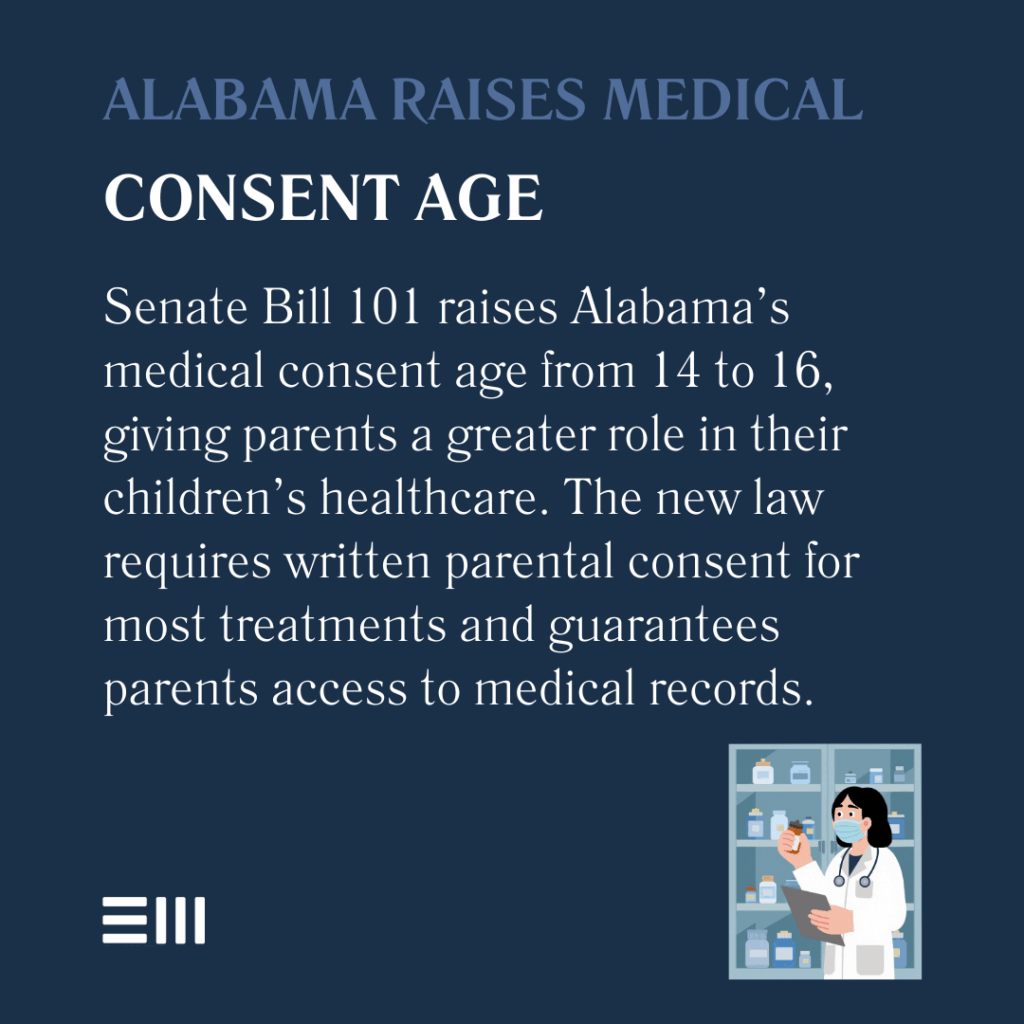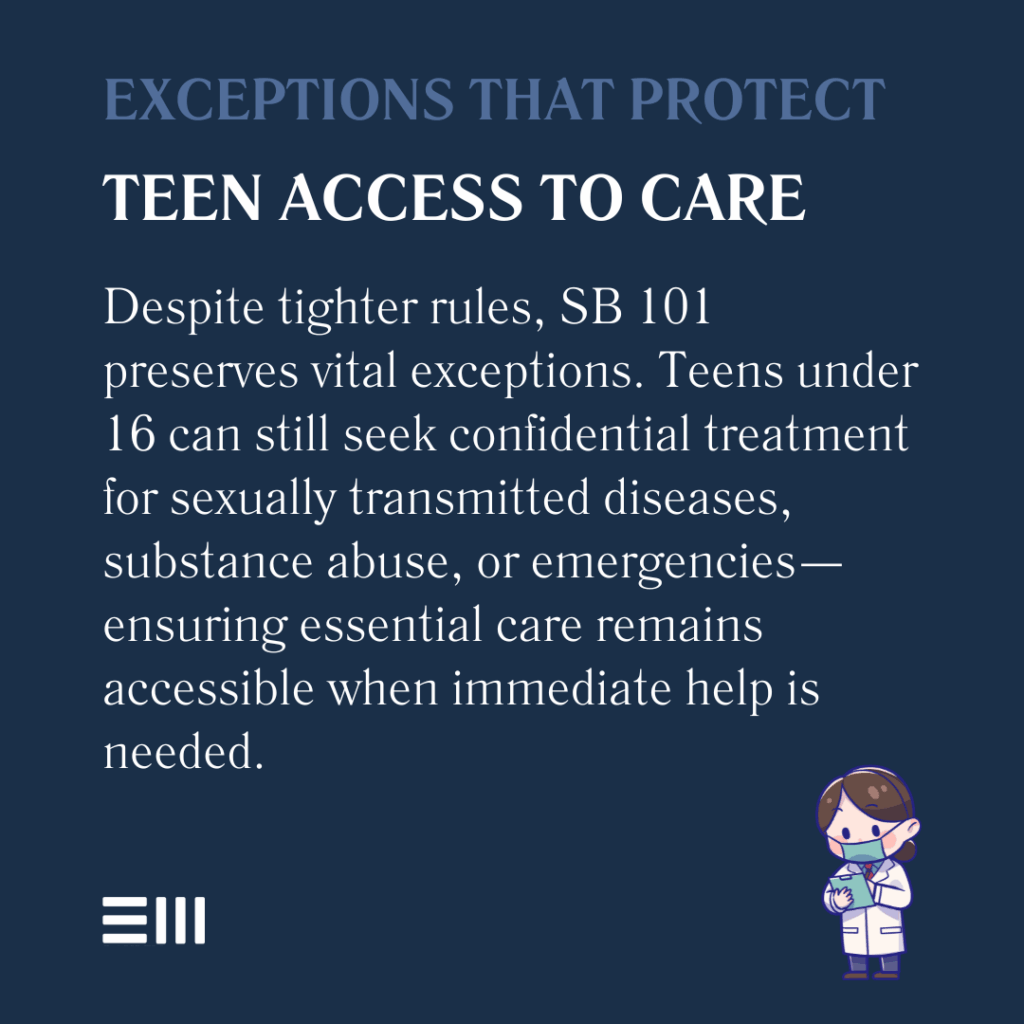
Alabama has joined the majority of states in restricting minors’ independent medical decision-making, raising the age of medical consent from 14 to 16 years old.
Senate Bill 101, which took effect on October 1, 2025, represents a significant shift in how medical decisions are made for Alabama’s youth, strengthening parental rights while maintaining critical exceptions for emergency and sensitive health situations.
Understanding Alabama’s Previous Position
For years, Alabama stood as an outlier in medical consent laws, allowing 14-year-olds to make independent healthcare decisions without parental involvement.
Only New Mexico shared this distinction, while most states set the medical consent age at 18. This unique position meant Alabama teens had unprecedented autonomy over their medical, dental, and mental health care—a situation that concerned many parents and lawmakers.
Rep. Susan DuBose, R-Hoover, noted the state’s unusual position: “The age of medical consent in most states has been 18. We were an outlier at 14.”
This disparity prompted legislative action to align Alabama more closely with national standards while addressing parental concerns about being excluded from their children’s healthcare decisions.

Key Provisions of Senate Bill 101
The new law, sponsored by Sen. Larry Stutts, R-Tuscumbia, introduces several important changes to Alabama’s healthcare landscape:
- Written Parental Consent: Minors under 16 now require written parental consent for most medical services, ensuring parents are involved in healthcare decisions.
- School-Based Services Notification: Schools must notify parents annually about available medical and counseling services and obtain permission for student participation.
- Access to Health Records: Healthcare providers and government agencies cannot deny parents access to their children’s health records unless a court order prohibits it or the parent is under investigation for crimes against the child.
- Affirmation of Parental Rights: The law explicitly recognizes parents’ fundamental right to make healthcare decisions for their minor children.
These provisions create a framework that prioritizes parental involvement while maintaining necessary protections.
Critical Exceptions Maintain Access to Care
Recognizing that some situations require confidential care, SB 101 preserves important exceptions allowing minors under 16 to consent independently for:
- Sexually Transmitted Disease Treatment: Ensuring teens can access testing and treatment without barriers.
- Substance Abuse Treatment: Allowing minors struggling with addiction to seek help confidentially.
- Emergency Medical Care: Preserving immediate treatment access when parents cannot be reached.
- Special Circumstances: Pregnant, emancipated, or independently living minors retain full medical decision-making authority.
These exceptions balance parental rights with recognition that certain health situations require confidential access to care.

Impact on Families and Healthcare Providers
The law’s implementation affects multiple stakeholders across Alabama’s healthcare system. Parents gain greater involvement in their children’s medical decisions, addressing longstanding concerns about being excluded from important health matters.
As DuBose explained, “They should not be locked out of viewing their records. They need to be part of the team to make sure their children get the best help and the best outcome.”
Healthcare providers must now adjust their practices, implementing new consent procedures and record-sharing protocols. This includes:
- Updated Consent Forms: Creating age-appropriate documentation systems.
- Staff Training: Ensuring all personnel understand the new requirements and exceptions.
- Communication Protocols: Establishing clear procedures for parental notification and involvement.
- Record Management: Adapting systems to provide appropriate parental access while protecting confidential information under exceptions.
These operational changes require careful implementation to ensure compliance while maintaining quality care.
Balancing Access and Protection
While supporters celebrate increased parental involvement, critics raise concerns about potential barriers to care, particularly for mental health services.
Some teens may delay or avoid seeking help if they fear parental involvement, especially in cases involving family conflict or sensitive personal issues.
Parent advocates counter these concerns, with one noting, “It’s really scary when you think about it. Fourteen-year-olds were making their own medical decisions without any parent involvement.”
This perspective emphasizes the importance of parental guidance in navigating complex medical decisions.
The debate reflects broader tensions between protecting minors and respecting their developing autonomy. Lawmakers acknowledge these concerns while maintaining that parental involvement generally improves health outcomes.
“How can a young person expect the best outcome if their parents aren’t engaged alongside their doctors?” DuBose asked, highlighting the collaborative approach the law aims to foster.
Legal Implications for Healthcare Decisions
Senate Bill 101’s passage intersects with other areas of family law, particularly in custody arrangements and medical decision-making authority. For divorced or separated parents, the law may impact:
- Custody Agreements: Joint legal custody arrangements must now address consent requirements for children under 16.
- Medical Decision Authority: Parents sharing legal custody must coordinate consent for non-emergency medical care.
- Record Access Rights: Both parents with legal custody maintain rights to access medical records.
- Emergency Situations: The law’s emergency exceptions prevent custody disputes from delaying critical care.
Understanding these intersections helps families navigate healthcare decisions within existing custody frameworks.
Looking Ahead: Potential Future Changes
Some Alabama lawmakers indicate plans to push the medical consent age higher, from 16 to 18, fully aligning with most other states. This potential change would further restrict minors’ independent medical decision-making while expanding parental authority over older teens’ healthcare choices.
Future legislative efforts may also address:
- Telehealth Considerations: Clarifying consent requirements for virtual healthcare services.
- Mental Health Services: Potentially creating additional exceptions or protections for counseling access.
- School-Based Care: Refining notification and consent procedures for educational settings.
- Interstate Issues: Addressing situations where Alabama minors seek care in states with different consent laws.
These evolving considerations reflect ongoing debates about balancing parental rights, minor autonomy, and healthcare access.
Navigating the New Healthcare Landscape
Alabama’s Senate Bill 101 represents a significant shift in how medical decisions are made for the state’s youth. While strengthening parental involvement in healthcare decisions, the law maintains critical exceptions ensuring minors can access essential care in sensitive situations.
As families, healthcare providers, and schools adapt to these new requirements, understanding both the law’s provisions and its exceptions becomes crucial for ensuring appropriate care while respecting parental rights.
If you have questions about how Senate Bill 101 affects your family’s healthcare decisions or intersects with custody arrangements, our experienced family law attorneys here at Baxley Maniscalco can provide guidance.
We understand the complexities of parental rights and can help you navigate these new requirements within your family’s unique circumstances.
Feel free to get in touch at (256) 770-7232 for a confidential consultation about how Alabama’s new medical consent law could impact your family.
Can't find what you're looking for? Search our site below.







